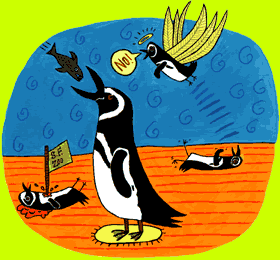
SAN FRANCISCO -- Death. It comes for us all in ways unexpected -- particularly so for wild animals. Zoos, however, often enable our furry friends to sidestep the natural process of eat-or-be-eaten, letting them live long enough to die a "natural" death of old age. But zoos are no sanctuary for certain penguins.
Since 1984, the San Francisco Zoo's Magellanic penguin colony has proven one of the world's most successful. About 130 penguins have been hatched there, enough that it recently exported half a dozen surplus birds to Portugal for the Lisbon Zoo.
But in recent years Death has stalked the zoo's popular Spheniscus magellanicus, most recently when three penguins died on August 6. The apparent cause? One of the strangest imaginable for a subantarctic species: Bad antimalaria pills.
It all goes back to the El Niño storms that wracked California in 1997-98, zoo spokesperson Nancy Chan explains. Those rains boosted the local mosquito population, some of which carried an avian strain of malaria to which Magellanic penguins -- which normally live in South America's colder southern reaches -- are especially vulnerable.
About half a dozen of the zoo's Magellanic penguin population fell ill with malaria in the summer of 1998, and three died. (While human malaria doesn't occur within a thousand miles of San Francisco, the avian variety has a wider range.)
Determined to stop future outbreaks, the zoo began feeding the penguins antimalaria pills with their daily dose of herring during mosquito season, which seemingly solved the problem.
Imagine, then, how zookeepers felt on August 6 when the Grim Reaper returned to Penguin Island. Less than an hour after their morning feeding, three penguins abruptly died of seizures -- two drowned while swimming and a third lay cold in its burrow before it could be treated.
The zoo's alarmed veterinary staff immediately drained the penguins' 96,000-gallon pool, fearing contaminants like lead -- or worse (although they were able to rule out polar bears). They herded the penguins together for roll call, rushed water samples to a nearby sewage-treatment plant for analysis, and fed the birds a charcoal compound to keep them from absorbing any other toxins that might be present. Three other penguins also experienced seizures but were treated in time to recover.
After necropsies were done on the dead penguins, suspicion fell on a just-opened bottle of antimalaria pills. Chan says that zookeepers use commercially prepared pills containing two chemicals. Mixed properly, the two provide malaria protection -- but in the wrong ratio, the theory goes, seizures and death are the result. At press time, the remaining pills were being analyzed to determine their precise role in the deaths.
Luckily for the zoo's 30-odd penguins, most got pills from an older, proven batch on August 6, and only the unlucky few whose pills came from the new, possibly tainted, batch became sick. Had all the zoo's penguins gotten the new pills, the colony could have been decimated.
Having explained this, spokesperson Chan signed off to deal with another impending disaster: She'd heard that some chuckling drive-time disk jockeys from "the Bay Area's party station!" were offering listeners $600 to jump into the zoo's gorilla enclosure. Chan did not specify which species of primate she would be rooting for.
Paul D. Kretkowski is a San Francisco-based reporter who pines for the moral compass and sure sense of duty the Cold War used to provide.
